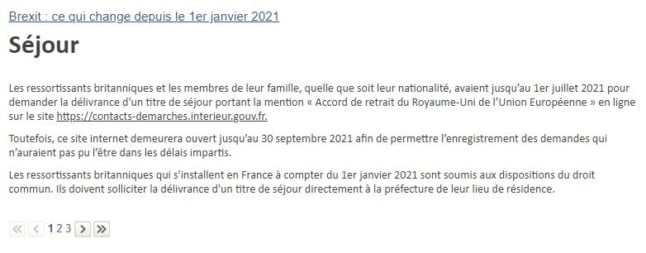There has been great confusion in recent days over whether Brits living in France had been given an extension to the original deadline to apply for residency, which fell on Wednesday, June 30th.
The French Interior Ministry confirmed to The Local an extension until September 30th the previous week and numerous local préfectures either advertised a delay on their websites or advised people of a delay in emails and texts.
However the British Embassy in Paris continued to insist that the June 30th deadline was still in place, even running an hour-by-hour countdown to the midnight deadline on their social media channels.
🚨⏰ONE HOUR TO GO⏰🚨
Apply for your Withdrawal Agreement residency permit NOW if you haven't already!
More information here: https://t.co/xvDEKe6ztY
— British in France (@BritishinFrance) June 30, 2021
On Thursday, however, the online portal for applications from UK nationals was still accepting applications and the French Interior Ministry has updated its site to clarify that the site will remain open and continue to accept applications until September 30th.

The site reads: “British nationals and their family members, regardless of nationality, had until July 1st, 2021 to apply online for the issuance of a residence permit marked ‘United Kingdom Withdrawal Agreement from the European Union’.
“However, this website will remain open until September 30th, 2021 to allow the registration of applications that could not be registered within the deadline.”
It was not immediately clear whether applications on the portal made now will count as ‘late applications’.
The Local has asked for clarification on this, but in the meantime citizens’ rights group British in Europe advises adding a note on your application explaining why you missed the June 30th deadline.
The online application form has a box at the end for ‘any other comments’ where this can be added. Even if you are using the English-language version of the form, it is better to add comments such as this in French, if possible.
You can find a full guide to using the form HERE.
The extra time comes amid concerns that many thousands of Brits in France are yet to apply, with many not realising that it applies to them.
The requirement to apply for residency applies to all UK nationals who were living in France before December 30th, 2020 – even those who have been here a long time, are married to a French or EU citizen or who previously had a residency card.
Find the full requirements and how to apply HERE.
Meanwhile some local authorities have reported being swamped with applications.
Renaud Nury, secrétaire général of the préfecture in the Creuse département told France Info: “We anticipated 800 applications but we have received 2,500 already” adding that a special office had been set up at the préfecture to deal with applications from Brits.
The deadline to be in possession of the carte de séjour was previously set for October 1st – to give time for applications to be processed. The Local has asked if this deadline will also be moved.
If you are struggling with the paperwork, head to our Dealing with Brexit section, or find a list HERE of organisations who will offer help with the process, free of charge.



 Please whitelist us to continue reading.
Please whitelist us to continue reading.
Is the Paris Embassy more or less useful than a chocolate teapot? Answers please to E. Llewellyn, 35, rue du Faubourg St Honoré, 75383 Paris, France.
As soon as applications opened to renew the carte de sejour, I applied, sent my previous one which expired in 2008, heard nothing for about three months the got RDV with the local Commissariat de Police , received new card two weeks later. I was lucky when the previous one expired I went to the Commissariat who advised me to keep the card and use it as an ID card, which I did.